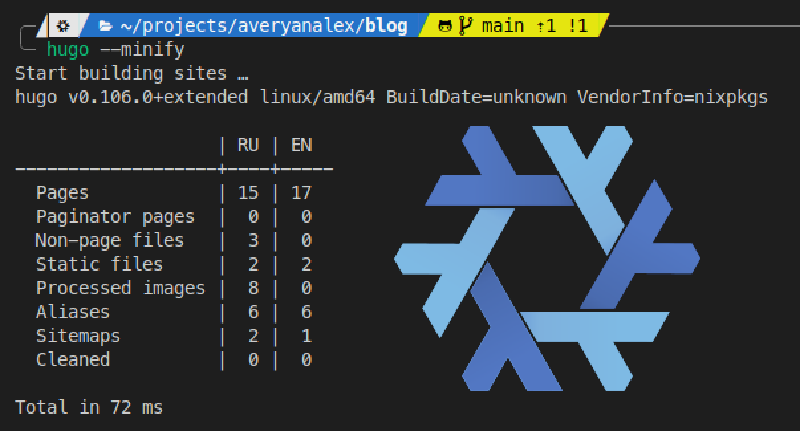Advantages of managing Hugo website with Nix.
- Reproducible builds: Nix allows you to reproducible build your Hugo website
across multiple machines.
- Dependency management: Nix makes it easy to manage theme, other dependencies
and even Hugo itself for your website.
- Easy deployment: just set root of your nginx virtualHost to site’s package.
Setup your site.
Write flake.nix.
This is an example of flake.nix I use for this blog, adapt it for your needs.
1
2
3
4
5
6
7
8
9
10
11
12
13
14
15
16
17
18
19
20
21
22
23
24
25
26
27
28
29
30
31
32
33
34
35
36
37
38
39
40
41
42
43
44
45
46
47
48
49
50
51
52
53
54
55
56
57
58
| {
description = "AveryanAlex's personal blog";
inputs = {
nixpkgs.url = "github:nixos/nixpkgs/nixos-unstable";
flake-utils.url = "github:numtide/flake-utils";
# Import theme
stack = {
url = github:CaiJimmy/hugo-theme-stack;
flake = false;
};
};
outputs = { self, nixpkgs, flake-utils, stack }:
flake-utils.lib.eachDefaultSystem (system:
let
pkgs = nixpkgs.legacyPackages.${system};
blog = pkgs.stdenv.mkDerivation {
name = "blog";
# Exclude themes and public folder from build sources
src = builtins.filterSource
(path: type: !(type == "directory" &&
(baseNameOf path == "themes" ||
baseNameOf path == "public")))
./.;
# Link theme to themes folder and build
buildPhase = ''
mkdir -p themes
ln -s ${stack} themes/stack
${pkgs.hugo}/bin/hugo --minify
'';
installPhase = ''
cp -r public $out
'';
meta = with pkgs.lib; {
description = "AveryanAlex's personal blog";
platforms = platforms.all;
};
};
in
{
packages = {
blog = blog;
default = blog;
};
devShells.default = pkgs.mkShell {
buildInputs = with pkgs; [ hugo ];
# Link theme to themes folder
shellHook = ''
mkdir -p themes
ln -sf ${stack} themes/stack
'';
};
});
}
|
Setup direnv.
1
2
3
| echo use flake >> .envrc
echo .direnv >> .gitignore
direnv allow
|
Add result to .gitignore.
Result folder is a symlink to built website created by nix build command.
1
| echo result >> .gitignore
|
Preview and build.
Run development server:
Build production release with nix:
Deploying to nginx webserver.
Now we will create nginx virtualHost config for the site.
Add website to server’s flake inputs:
1
2
3
| {
inputs.blog.url = "github:averyanalex/blog";
}
|
Setup nginx virtualHost to serve your site:
1
2
3
4
5
6
7
8
9
| { inputs, pkgs, ... }:
{
services.nginx.virtualHosts."averyan.ru" = {
root = inputs.blog.defaultPackage.${pkgs.hostPlatform.system};
useACMEHost = "averyan.ru";
forceSSL = true;
};
}
|
